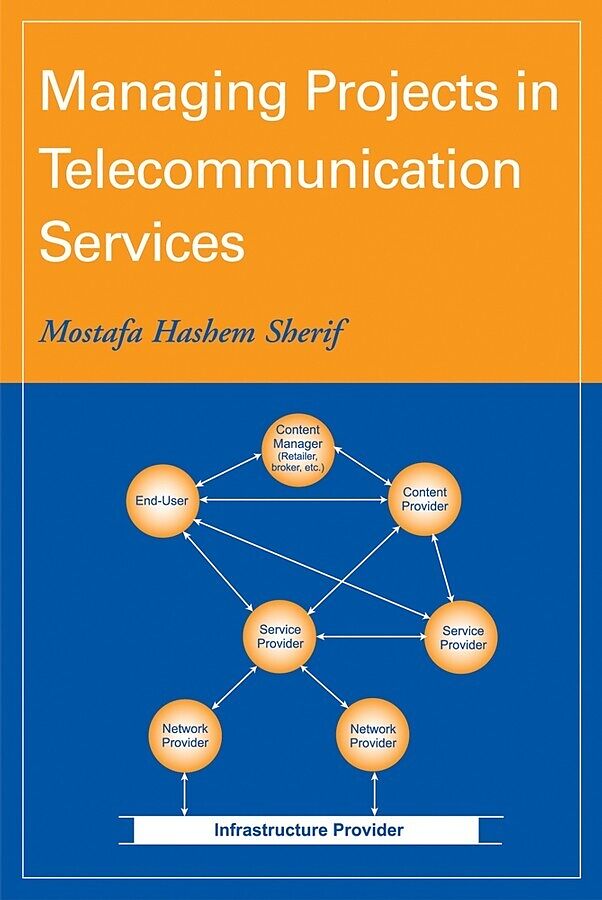Managing Projects in Telecommunication Services
Einband:
E-Book (pdf)
EAN:
9780470047675
Untertitel:
Englisch
Genre:
Elektronik, Elektrotechnik, Nachrichtentechnik
Autor:
Mostafa Hashem Sherif
Herausgeber:
Wiley-IEEE Press
Anzahl Seiten:
500
Erscheinungsdatum:
13.10.2006
ISBN:
978-0-470-04767-5
Effective project management tailored to the needs of the telecommunications industry
"In our rapidly changing world, the information and communication technologies and services have an immense impact on virtually all aspects of our lives. . . . With his deep understanding of the telecommunication services, and his rich experiences in both standardization activities and teaching practice, [Dr. Sherif's] book provides a very clear analysis of development projects in telecommunication services. I believe the readers will find this book very useful and interesting."
--Houlin Zhao, Director, Telecommunication Standardization Bureau,International Telecommunication Union
"Dr. Sherif's book is an important contribution to the project management literature. With the domination of the service economy in recent years, the book addresses the unique features of telecommunication services, a critical pillar of the service sector. Development projects in telecommunications require combining good knowledge of the fundamentals of project management with clear understanding of the complexities arising from fast-changing technology, deregulations, standards, accountability, and supply chain management difficulties. This book addresses the much-needed integrative approach very well."
--Tarek Khalil, President, International Association for Management of Technology (IAMOT)
While there has been much written about project management, the vast majority of the literature focuses on industrial design and production. In Managing Projects in Telecommunication Services, Mostafa Hashem Sherif effectively demonstrates the unique requirements of projects in telecommunication services and, consequently, the benefits of an integrated approach to project management that is specifically tailored to the telecommunications industry.
Managing Projects in Telecommunication Services draws from a wide range of disciplines, including organizational management, motivation, quality control, and software engineering. All the theory and practical guidance that an effective telecommunications project manager needs is provided.
The text is divided into three main parts:
* Chapters 1 through 3 set forth the special characteristics of telecommunications projects, including technology life cycle, type of innovation, and project organization
* Chapters 4 through 10 cover the areas that the Project Management Institute has standardized in its publication A Guide to the Project Management Body of Knowledge (PMBOK® Guide), focusing on the issues specific to telecommunications. Chapters address scope, schedule and cost, information and communication, human resources, quality, vendor management, and risk
* Chapters 11 and 12 integrate and summarize all of the concepts for the planning and delivery of a project
Chapters are loaded with examples and case studies, many from the author's personal experience, that demonstrate the benefits of good project management and the consequences of poor project management. Each chapter includes a summary of key points. References are also provided to facilitate further research and study.
For project managers as well as students in telecommunications, this text is unsurpassed. It not only covers the theory and practice of effective project management, it also tailors its discussion specifically to the unique needs of the telecommunications industry.
(PMBOK is a registered mark of the Project Management Institute, Inc.)
Autorentext
MOSTAFA HASHEM SHERIF, PhD, is a Certified Project Manager and internationally recognized as an expert on standards for packetized voice and digital signal processing in transmission equipment. He currently is a Senior Technical Specialist for AT&T and is the recipient of the AT&T Standards Recognition Award. Dr. Sherif holds several U.S. patents and is the Standards coeditor for IEEE Communications Magazine and the author of the bestselling book Protocols for Secure Electronic Commerce.
Inhalt
Foreword xiii Preface xv 1 Projects in Telecommunication Services 1 Introduction 1 Project Management Versus Product Management 1 Virtual Network Operators 3 Contribution of Project Management 4 The Two Facets of Telecommunication Services 5 Categories of Projects in Telecommunication Services 6 Upgrades of Public Networks 7 Establishment of Specialized Business Networks 8 Temporary Networks 10 Characteristics of Telecommunication Service Projects 11 Complex Interfaces 11 External Interfaces 11 Internal Interfaces 12 International Orientation 15 Multidisciplinarity 15 No Mass Production 16 Diverse Users 16 A Relatively Long Planning Stage 17 Summary of Distinctions Between the Development of 17 Telecommunication Services and Equipment Summary 17 2 Standards and Innovation in Telecommunication Services 19 The Two Dimensions of Telecommunication Projects 19 The Technological Dimension 19 The Marketing and Social Dimension 22 Classification of Innovations 23 Innovations and the Technology Life Cycle 25 Innovation in Telecommunication Services 26 Incremental Innovation 27 Architectural Innovation 28 Platform Innovation 30 Radical Innovation 30 Interaction of Innovations in Equipment and Services 30 Phasic Relation Between Equipment and Services 31 Standardization for Telecommunication Services 34 Timing of Standards 35 Marketing Perspective 35 Technological View of Standards 35 Anticipatory Standards 36 Enabling (Participatory) Standards 37 Responsive Standards 38 Lack of Standards 38 Standards Policy and Knowledge Management 39 Summary 40 3 The Project Management Context 43 Organization of the Project Team 43 Functional Organization 44 Examples 45 Advantages 47 Disadvantages 47 Matrix Organization 47 Examples 48 Advantages 50 Disadvantages 50 Projectized Organization 50 Examples 51 Advantages 51 Disadvantages 51 Comparison of Project Organizations 52 Project Organization and Innovation Type 52 Incremental Innovation 52 Architectural Innovation 53 Platform Innovation 54 Radical Innovation 54 The Role of the Project Sponsor 54 Phase Management and Portfolio Management 56 The Rolling Wave Method for Service Development 56 Phase 1: Concept Definition 57 Phase 2: Initiation and Preliminary Planning Phase 58 Phase 3: Implementation 58 Phase 4: Controlled Introduction 58 Phase 5: General Availability and Close-Out 59 Canceling Projects 59 Relation to the BuildOperateTransfer Model 59 Summary 60 4 Scope Management 61 Scope Initiation 62 Scope Planning 62 Market Service Description (MSD) 62 Scope Definition 63 Work Breakdown Structure 63 Technical Plan 64 The Need for Scope Management 66 Salt Lake City Winter Olympics 66 E-Zpass Toll Collection System 66 Background 66 Gaps in the Definition ITS Scope 67 Scope Creep in New Jersey 68 Sources of Scope Change 68 Customer Profile 69 Vendor's Effect 69 Basic Principles of Scope Management 69 Change Control Policy 71 Strictness of the Change Control Policy 71 Change Control Board 72 Scope Verification 72 Tracking and Issue Management 72 Projec...

Leider konnten wir für diesen Artikel keine Preise ermitteln ...
billigbuch.ch sucht jetzt für Sie die besten Angebote ...
Die aktuellen Verkaufspreise von 6 Onlineshops werden in Realtime abgefragt.
Sie können das gewünschte Produkt anschliessend direkt beim Anbieter Ihrer Wahl bestellen.
Loading...
Die aktuellen Verkaufspreise von 6 Onlineshops werden in Realtime abgefragt.
Sie können das gewünschte Produkt anschliessend direkt beim Anbieter Ihrer Wahl bestellen.
| # | Onlineshop | Preis CHF | Versand CHF | Total CHF | ||
|---|---|---|---|---|---|---|
| 1 | Seller | 0.00 | 0.00 | 0.00 |
